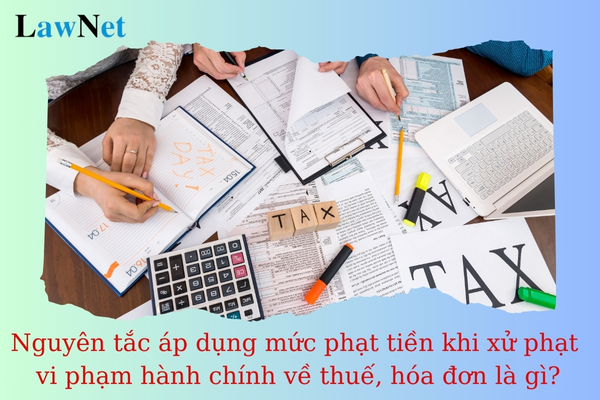What are the principles for imposition of fines for tax or invoice-related administrative violations in Vietnam?
What are the principles for imposition of fines for tax or invoice-related administrative violations in Vietnam?
Based on Clause 4, Article 7 of Decree 125/2020/ND-CP governing the principles for imposition of fines for tax or invoice-related administrative violations, the regulations are as follows:
- The fine levels stipulated in Article 10, Article 11, Article 12, Article 13, Article 14, Article 15, Clauses 1 and 2 of Article 19, and Chapter III of Decree 125/2020/ND-CP apply to organizations. For taxpayer households and business individuals, the penalty levels apply as for individuals.
- When determining the fine for a taxpayer with both aggravating and mitigating circumstances, the aggravating circumstances can be reduced according to the principle that one mitigating circumstance reduces one aggravating circumstance.
- Circumstances that have been used to determine the penalty frame cannot be used when determining the specific fine.
- When imposing a monetary fine, the specific penalty level for a tax, invoice procedure violation, and the act stated in Article 19 of this Decree is the average level of the penalty frame prescribed for that act:
+ If there are mitigating circumstances, each circumstance reduces 10% of the average penalty level of the penalty frame, but the fine for that act cannot be reduced beyond the minimum level of the penalty frame;
+ If there are aggravating circumstances, each circumstance increases 10% of the average penalty level of the penalty frame, but the fine for that act cannot exceed the maximum level of the penalty frame.

What are the principles for imposition of fines for tax or invoice-related administrative violations in Vietnam? (Image from the Internet)
What are the mitigating and aggravating circumstances in the field of tax and invoices in Vietnam?
According to Article 6 of Decree 125/2020/ND-CP, the mitigating and aggravating circumstances in the field of tax and invoices are as follows:
- Aggravating and mitigating circumstances as prescribed by the law on handling administrative violations.
- Large-scale administrative violations include two cases:
+ Administrative violations with tax amounts (insufficient tax, evaded tax, or higher exempted, reduced, refunded tax amounts) from 100,000,000 VND or more or the value of goods and services from 500,000,000 VND or more are determined as large-scale tax administrative violations under Point l, Clause 1, Article 10 of Law on Handling Administrative Violations 2012.
+ Administrative violations of 10 or more invoices are determined as large-scale invoice administrative violations under Point l, Clause 1, Article 10 of Law on Handling Administrative Violations 2012.
What are the cases of exceptions to tax or invoice-related administrative penalties?
Based on Article 9 of Decree 125/2020/ND-CP, the cases of exceptions to tax or invoice-related administrative penalties are as follows:
- Administrative violations concerning tax and invoices are not sanctioned for cases exempted from administrative penalties as per the law on handling administrative violations.
Taxpayers who are delayed in completing tax, invoice procedures electronically due to technical failures of the information technology system, as announced on the tax authority's electronic portal, are considered force majeure events under Clause 4, Article 11 of Law on Handling Administrative Violations 2012.
- No administrative penalties on tax violations or late tax payment fees apply to: Taxpayers who commit administrative tax violations according to instructions or handling decisions by tax authorities or state agencies with authority regarding the determination of taxpayer obligations (even if these instructions, handling decisions were issued before the effective date of this Decree), except in cases where audits, inspections at the taxpayer's premises do not uncover taxpayer mistakes in declaring or determining tax payable amounts, exemptions, reductions, or refunds, but later the taxpayer's administrative tax violation is discovered.
- No administrative penalties for tax violations apply in cases of incorrect declarations where taxpayers amend tax documentation and voluntarily pay the full payable tax amount before the tax authority announces tax audit or inspection decisions at the taxpayer's premises, or before the tax authority discovers violations without audits or inspections at the taxpayer's premises, or before other competent authorities discover them.
- No penalty for procedural tax violations apply to individuals directly settling personal income tax returns who are late in submitting tax returns when there is an arising amount of tax refund; business households, individuals assessed tax under Article 51 of Law on Tax Administration 2019.
- No sanction for violations regarding the deadline for submitting tax declarations during the period that taxpayers are allowed to extend the deadline for submitting such declarations.

